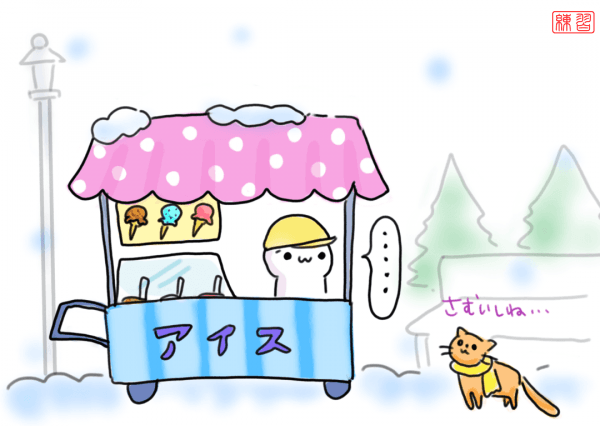As many/much as A
- As many/much as A
- Also A; A as well
- Nothing/no one/nobody (A) A is the question term such as nothing, no one, nowhere, etc (だれ+も = no one, なに+も = nothing). This is followed by a negative statement B that links to A
- Even [T], not even A The negative form (not even) can be identified when the verb following the も is in the negative form.
- Neither A nor B A and B are generally opposites (hot/cold, easy/hard, etc.)
21
私のお祖父さんは、犬を4匹も飼って居る。
My grandfather has four dogs.
0
14
此の短い報告書を書くのに3日も掛かった。
It took three whole days to write this short report.
0
10
北海道は東京都の何倍も大きいです。
Hokkaido is many times larger than the Tokyo area.
0
8
何でラジオを3台も持って居るの?
Why do you have three radios?
0
14
こんなにも宿題が有って、どうしたらいい乃だ。
I have so much homework, what should I do.
0
33
バスを30分も待ちました。
I waited on the bus for 30 minutes.
0
3
彼は私の4倍も本を持って居る。
He has four times as many books as I do.
0
5
彼は切手を500枚も集めた。
He has collected no fewer than five hundred stamps.
0
4
彼女は七人も子供が居る。
She has as many as seven children.
0
Getting the sentences
Construction
(Elements in parentheses are optional.)
Basic Examples:
十回も (as many as ten times)
Notes
When も is added, this emphasizes that the number/amount is above normal.
Where this grammar is found
Grammar usage notes
with a negative verb it can mean as little as.
Questions/Discussion
Nothing posted yet!
Also A; A as well
- As many/much as A
- Also A; A as well
- Nothing/no one/nobody (A) A is the question term such as nothing, no one, nowhere, etc (だれ+も = no one, なに+も = nothing). This is followed by a negative statement B that links to A
- Even [T], not even A The negative form (not even) can be identified when the verb following the も is in the negative form.
- Neither A nor B A and B are generally opposites (hot/cold, easy/hard, etc.)

私も作りたいです!
I want to make it, too!
13
彼女と彼も今夜のパーティーに来るそうです。
I heard that she and he will also be coming to the party tonight.
0
19
ケーキを食べたけど、ドーナツも食べたいな。
I've already eaten cake, but I want to eat donuts, too.
0
14
3年前も、彼らは布哇に行きました。
They also went to Hawaii three years ago.
0
31
私は猫も犬も沢山飼いたい!
I want to have lots of both cats and dogs (as pets)!
0
21
屹度彼も同じ様に思ったでしょう。
Surely he too felt the same way.
0
1
彼は待ちます。彼女も待ちます。
He waits. She waits, too.
0
1
母は荷物を送ります。手紙も送ります。
Mom sends a package. She sends a letter, too.
0
2
会社で働きます。家でも働きます。
I work at the company. I work at home, too.
0
18
到頭我が社も破産だ。
In the end, our company (too) is bankrupt.
0
14
此の建物も又銀行です。
This building also is a bank.
0
6
貴方もそう思わない?
Don't you, too, think so?
0
3
其の寺へも行った。
We also went to the temple.
0
5
レンタカーの予約もお願いします。
I would also like to rent a car.
0
9
今日も眠い。
I'm sleepy today, too.
0
9
彼は今日も帰りが遅い。
He is also returning late today.
0
1
彼は水泳が達者でテニスも上手い。
He is a good swimmer and also plays tennis well.
0
Getting the sentences
Construction
(Elements in parentheses are optional.)
Basic Examples:
私も (me too)
Where this grammar is found
Grammar usage notes
Nothing posted yet!
Questions/Discussion
Nothing posted yet!
Nothing/no one/nobody (A)
A is the question term such as nothing, no one, nowhere, etc (だれ+も = no one, なに+も = nothing). This is followed by a negative statement B that links to A
- As many/much as A
- Also A; A as well
- Nothing/no one/nobody (A) A is the question term such as nothing, no one, nowhere, etc (だれ+も = no one, なに+も = nothing). This is followed by a negative statement B that links to A
- Even [T], not even A The negative form (not even) can be identified when the verb following the も is in the negative form.
- Neither A nor B A and B are generally opposites (hot/cold, easy/hard, etc.)

雪が降ったから誰も来なかった。
It snowed so no one came.
13
何事もなく、無事に戻りました。
I (they) returned safely without incident.
0
12
御店に入ったが、誰も居なかった。
We entered the store, but no one was there.
0
11
今は何も食べたくないんです。
I don't want to eat anything now.
0
12
探して居る本が何処にもない。
The book I'm looking for is nowhere (to be found).
0
5
君にして欲しいことは、何もない。
There is nothing I want you to do.
0
0
ダイエットとはいえ、何も食べないのは体に良くない。
You say you're on a diet, but eating nothing is not good for your health.
0
13
生憎周囲に誰も居なかった。
Unfortunately there was no one around.
0
11
貴方を待つ以外に為ることは何も無い。
I don't have anything else to do but wait for you.
0
20
此の条件に該当為る人は誰も居ない。
There is nobody who fulfils these conditions.
0
9
其の事実は誰にも否定出来ない。
No one can deny the fact.
0
4
其の箱には何も有りませんでした。
There was nothing in the box.
0
Getting the sentences
Construction
(Elements in parentheses are optional.)
Basic Examples:
誰も居ない (no one)
Where this grammar is found
Grammar usage notes
Nowhere is not どこも; it is usually paired with the particles に or で (depending on the verb that follows).
ボールはどこでも見つからない - I can't find the ball anywhere.
おとうとはどこにもいない! - My brother isn't anywhere!
ボールはどこでも見つからない - I can't find the ball anywhere.
おとうとはどこにもいない! - My brother isn't anywhere!
Questions/Discussion
Nothing posted yet!
Even [T], not even A
The negative form (not even) can be identified when the verb following the も is in the negative form.
- As many/much as A
- Also A; A as well
- Nothing/no one/nobody (A) A is the question term such as nothing, no one, nowhere, etc (だれ+も = no one, なに+も = nothing). This is followed by a negative statement B that links to A
- Even [T], not even A The negative form (not even) can be identified when the verb following the も is in the negative form.
- Neither A nor B A and B are generally opposites (hot/cold, easy/hard, etc.)
14
高田君は歌だけでなく絵も上手で、皆驚きました。
Everyone was surprised because Takada is good at not just singing but drawing as well.
0
14
彼は運動が苦手で、歩くのも嫌がります。
He's not one for exercise, and he doesn't like walking either.
0
14
私の祖父は携帯も殆ど使えない。
My grandfather can hardly even use a cell phone.
0
Getting the sentences
Construction
(Elements in parentheses are optional.)
Basic Examples:
日本人も (even a Japanese person)
Basic Examples:
行く時も (even when (one) goes)
Basic Examples:
歩きも為ない (won't even walk)
Where this grammar is found
Neither A nor B
A and B are generally opposites (hot/cold, easy/hard, etc.)
- As many/much as A
- Also A; A as well
- Nothing/no one/nobody (A) A is the question term such as nothing, no one, nowhere, etc (だれ+も = no one, なに+も = nothing). This is followed by a negative statement B that links to A
- Even [T], not even A The negative form (not even) can be identified when the verb following the も is in the negative form.
- Neither A nor B A and B are generally opposites (hot/cold, easy/hard, etc.)
14
彼も此れも全部要らない。
I need neither this, that, nor anything.
0
1
私は珈琲もお茶も好きじゃない。
I like neither coffee nor tea.
0
Getting the sentences
Construction
(Elements in parentheses are optional.)
Basic Examples:
大きくても小さくても無い (neither big nor small)
Basic Examples:
単純でも複雑でも無い (Neither simple nor complicated)
Basic Examples:
日本も亜米利加も無い (neither Japan nor the US)
Basic Examples:
行きも来も為ない (neither coming nor going)
Where this grammar is found
Grammar usage notes
Nothing posted yet!
Questions/Discussion
Nothing posted yet!